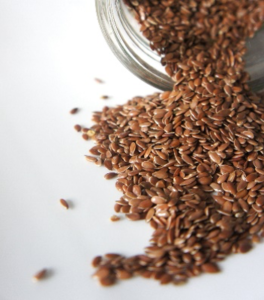Coral Clarke, RDN, CDN
DOWNLOAD: Amazing Omega 3’s_FFHA2020
 Rarely a week goes by without the announcement of a study touting the benefits of omega 3 fatty acids. Known to play a crucial role in brain function, omega 3’s also appear to reduce inflammation. This can reduce the risk of chronic diseases such as cancer, arthritis, and heart disease. We’ve all heard that we should increase our consumption of fish to get more omega 3’s, but is that all there is to it? And is fish the only source of these important fats?
Rarely a week goes by without the announcement of a study touting the benefits of omega 3 fatty acids. Known to play a crucial role in brain function, omega 3’s also appear to reduce inflammation. This can reduce the risk of chronic diseases such as cancer, arthritis, and heart disease. We’ve all heard that we should increase our consumption of fish to get more omega 3’s, but is that all there is to it? And is fish the only source of these important fats?
Types of Omega 3 Fats
Omega 3 fats affect the body by producing eicosanoids, which are hormonal regulators of inflammation. Some eicosanoids promote inflammation, a necessary response to bodily injury, and others work to reduce this reaction. Saturated fats, found in meat and tropical oils, create increase inflammation. To a lesser extent so do omega 6 fats, found in poultry, nuts, and eggs. Omega 3’s create anti-inflammatory eicosanoids. Both types of omega fats are important for our health, but many people eat too much omega 6 and too little omega 3.
There are types of omega 3 fats commonly studied. The first two–EPA (eicosapentaenoic acid) and DHA (docosahexaenoic acid)–are found almost exclusively in fish, particularly species that live in cold water. Examples of these are salmon, herring, mackerel, and sardines. While fish-lovers can rejoice at their good luck, this poses a challenge for those who don’t care for seafood or who eat a vegetarian diet. This is where the third omega 3 fat, ALA (alpha-linolenic acid), comes in. ALA is a plant-based omega 3 fat. Like EPA and DHA, ALA provides its own health benefits. As an added bonus, some studies suggest that our bodies can convert a portion of the ALA we consume into EPA – perhaps as much as 10%.
Sources of ALA Fats
 Flax seeds and oil
Flax seeds and oil
Just a teaspoon of whole flax seed provides ½ to ¾ of the daily requirement for ALA. For the best absorption, grind the seeds and sprinkle them on cereal or yogurt. Ground flax can also be added to muffins or sprinkled on top of casseroles for a crunchy nutritious boost.
Flaxseed oil burns easily and so is not useful for cooking. However, it makes a flavorful addition to salads and salad dressings.
Hemp seeds
One tablespoon of hemp seed contains ½ to ¾ of a day’s ALA. Hemp seed can be sprinkled on salads or cereal, added to smoothies, or made into hemp “milk”.
Chia seeds
Along with their whopping 5 grams of ALA per ounce (four times a person’s daily needs), chia seeds blow away the competition with their versatility. These tiny tasteless seeds can be added to nearly any food. Their tendency to absorb liquid and form a gel also makes them handy helper in the kitchen. Need to thicken a soup or gravy? Throw in some chia! Trying to adapt a recipe for a vegan friend (or just out of eggs)? Combine one tablespoon of chia seeds with 3 tablespoons of water for a quick egg-replacer.
Walnuts
One ounce of walnuts (14 halves) provides 1-2 times the daily requirement of ALA. Throw some chopped nuts into your hot cereal, smoothies, or baked goods for a healthy nutty crunch.
Canola oil
With its light flavor and high smoke point, canola oil is good for baking and frying. Add in its one-day-supply of ALA per tablespoon, and canola oil will quickly become your cooking oil of choice.
Whether you choose fish, flax, hemp, chia, walnuts, canola, or all of the above, be sure to include some tasty omega 3’s in your day, everyday!
Take Home Points
- Omega 3 fats are an important part of a healthy diet.
- There are three types of omega 3 fats: DHA, EPA, and ALA.
- ALA fats are plant-based omega 3’s that are found in flax seeds, hemp seeds, chia seeds, walnuts, and canola oil.
References
- “FoodData Central.” FoodData Central, USDA, fdc.nal.usda.gov/.
- Mahan, L. Kathleen, et al. Krause’s Food & the Nutrition Care Process. Elsevier, 2012.
Author Information

Coral Clarke, RDN, CDN is a registered dietitian nutritionist providing integrative and functional nutrition care. Coral received her Bachelor of Science in Nutrition from the State University of New York College at Buffalo. She works for Buffalo Nutrition and Dietetics, PLLC, specializing in gastrointestinal disorders, food allergies, and food sensitivities out of their office in the functional medicine clinic at DENT Neurologic Institute in Buffalo, NY. www.buffalo-nutrition-and-dietetics.com
No conflicts of interest to report.






